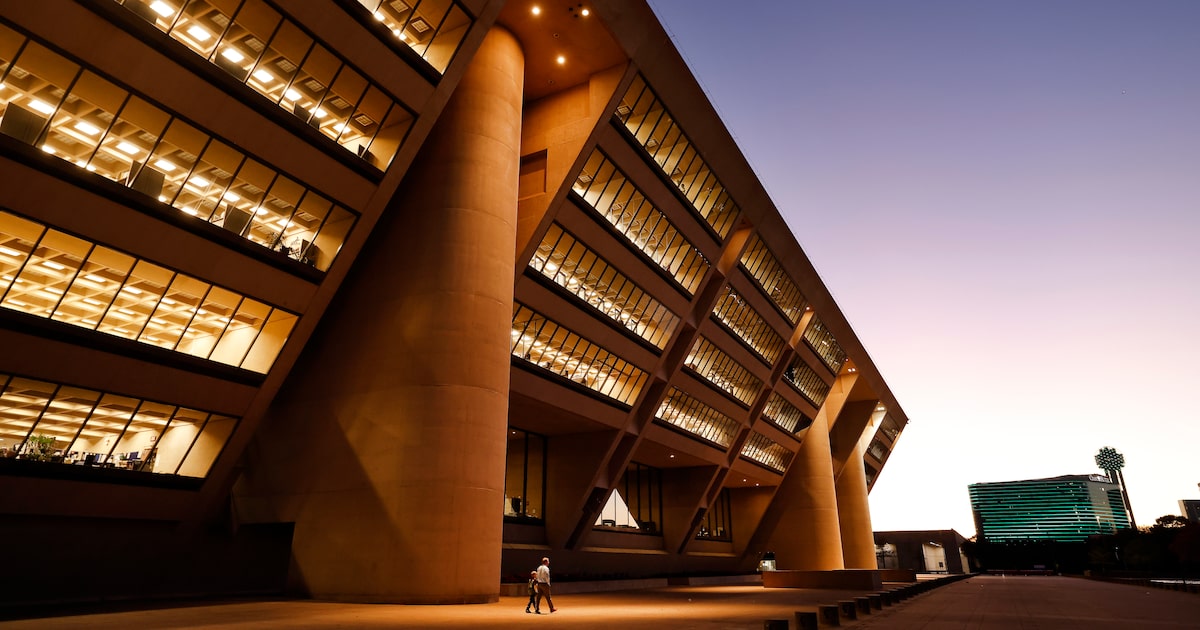Some Dallas City Council members fear last week’s vote to explore alternatives for the deteriorating City Hall building sets the stage for its eventual demolition.
Council members Paul Ridley and Paula Blackmon, two of the three votes against the plan, told The Dallas Morning News the decision leaves key questions unanswered, particularly why the process is moving so quickly and what’s driving the urgency.
“It’s kind of a sad day because it feels like the beginning of the end,” Blackmon said. “I really hope we know what we’re doing.”
When asked whether the vote signals a move toward demolishing City Hall, Ridley said, “Oh, absolutely.” He noted that the building is purpose-built for government use and poorly suited for commercial tenants.
Political Points
“If we move out, no one’s going to move in here,” he said.
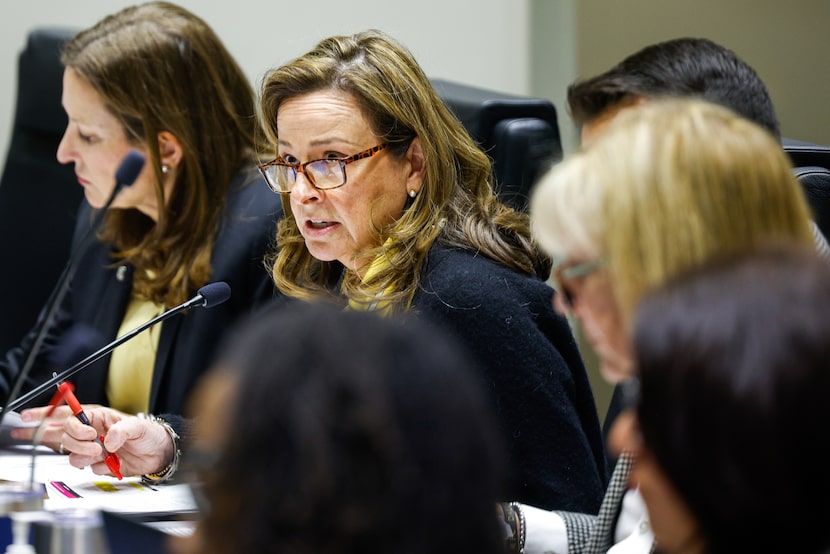
Dallas council member Paula Blackmon gives updates on White Rock Hills Recreation Center construction during a Dallas City Council meeting on Wednesday, Nov. 12, 2025, at Dallas City Hall. Blackmon said the center is set to be completed in 2028.
Christine Vo / Staff Photographer
Both Ridley and Blackmon said they voted against the resolution because they wanted a full assessment of the building’s condition and repair costs before exploring alternatives. They also suspect undeclared developer interest may be driving the push to relocate, though no developer has publicly confirmed interest.
“A lot of people are talking about it, but we haven’t seen any evidence that there is such interest,” Ridley said. “I suspect that’s what’s motivating this rush to judgment about the future of City Hall. I can’t think of any other reason why we would have to rush this process like we are.”
The council voted 12–3 on Wednesday to direct City Manager Kimberly Bizor Tolbert to evaluate real estate opportunities, including potential relocation sites for Dallas’ municipal government, and report back to the council’s finance committee by February 2026. The resolution also requires a third-party assessment of deferred maintenance costs for City Hall and an exploration of economic development opportunities for the downtown City Hall site.
The process began just three weeks ago, when the Finance Committee first discussed City Hall’s condition on Oct. 21. Ridley compared the speed to the city’s 2022 purchase and subsequent sale of the 7800 N. Stemmons Freeway building, which was later found to have fire code violations and failed to meet permitting needs.
“We never make critical decisions this quickly when it regards real estate, even real estate that city government isn’t occupying and doesn’t have well-defined purposes for,” Ridley said.
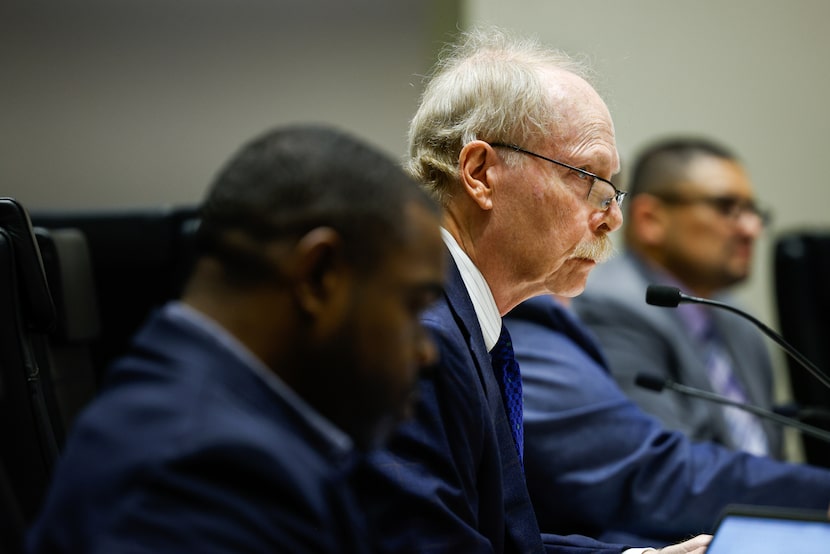
City Council member Paul Ridley listens to speakers during a Dallas City Council meeting on Wednesday, Nov. 12, 2025, at Dallas City Hall.
Christine Vo / Staff Photographer
The vote comes as city staff estimate fully repairing the 47-year-old I.M. Pei-designed building could cost between $152 million and $345 million, including up to $145 million for garage repairs, up to $100 million to address water leak damage, and up to $40 million for HVAC upgrades.
The discussion comes as the Dallas Mavericks are seeking a new arena ahead of their 2031 lease expiration at the American Airlines Center. The City Hall land has been mentioned by some as a potential building site, but the team hasn’t indicated where it would like to relocate.
Related
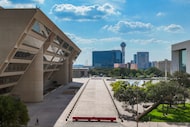
During Wednesday’s meeting, nearly 30 speakers, including plan commissioners, a former council member, and preservation advocates, urged the council to reject the resolution, fearing it would lead to the iconic structure being torn down and being redeveloped into something less meaningful.
In response, council members and city officials emphasized that there was no predetermined outcome.
Council Member Chad West framed the vote as a fact-finding mission, not a decision on whether to stay or leave City Hall. He cited Mayor Eric Johnson’s August directive to the Finance Committee to evaluate whether City Hall and other facilities “effectively support city operations and best serve the citizens of Dallas.”
Tolbert echoed West, calling the resolution “an opportunity to take a clear-eyed look” at the building’s future.
“This is about a research process right now,” she said. “It’s about making sure we are not jumping to any conclusion.”
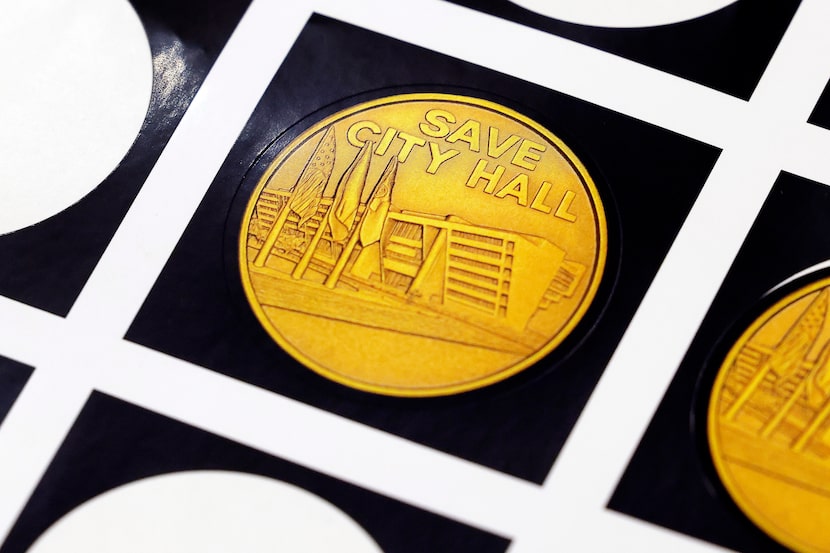
Stickers were available for residents who shared their thoughts on the future of City Hall in Dallas, November 3, 2025. Residents and civic leaders gathered in the auditorium to show their support for the iconic structure and its much needed renovations.
Tom Fox / Staff Photographer
Several council members acknowledged the building’s structural and functional issues but stressed the need for information on all options for the building’s future. Council member Jesse Moreno, whose district includes City Hall, assured residents there was “no conspiracy theory” and “no decision that is already made.”
Council member Zarin Gracey called for an assessment of the building’s functionality, noting safety issues like missing guardrails that led to a resident falling on the stairs in the council chambers.
Council member Laura Cadena, who, like Gracey, is a former city employee, recounted days of having to use a space heater and walking around with a blanket because of climate control issues in the building, having to walk around puddles in the parking garage, and knowing she risked getting stuck if she rode certain elevators in the building.
“For some, fixing the building seems like a fast decision,” she said. “For me, it seems very slow.”
Council member Cara Mendelsohn asked Tolbert on Wednesday about the process, noting the speed at which the resolution appeared on a council agenda for a vote felt like it was being treated like an emergency item. Tolbert indicated that the process moves as fast or as slow as the City Council wants it to.
“I work at the pleasure of the City Council,” she said. “We are moving based on the direction that has been given.”
Mendelsohn didn’t respond to requests for comment.
Among the supporters of the resolution were 34 prominent Dallas business, civic and nonprofit leaders who sent a joint letter to City Council members on Nov. 10 urging them to support exploring alternatives to the current City Hall site. The signees included former Dallas Mavericks CEO Cynt Marshall, Woodall Rodgers Park Foundation Chair Jody Grant, former U.S. Assistant Secretary of Education Tom Luce, and developers such as Mike Ablon, Brian Bergersen, Lucy Crow Billingsley, Craig Hall, Mike Hoque, Shawn Todd, and Ray Washburne.
In the letter, the group argues that now is the time for Dallas to act with urgency to ensure a vibrant downtown core, especially as the city invests in projects like a more than $3 billion downtown convention center and the Safe in the City initiative.
“A thorough assessment of whether to move City Hall into existing commercial office space also would send a powerful signal that Dallas is thinking differently and acting decisively, and it would underscore the city’s confidence in the future of its urban center,” the letter said.
The group outlined several reasons why now is the right time to explore relocation: repairing the aging building could cost hundreds of millions of dollars, which may not be the best use of limited city funds; current market conditions offer a chance to lease or buy high-quality downtown office space at favorable prices; redeveloping the City Hall site could help revitalize downtown and boost the city’s tax base; and evaluating a move of City Hall would show Dallas’ commitment to modernizing government operations.
“It is time to reimagine how Dallas government operates and aid the growth and prosperity of the city’s core,” the letter said.
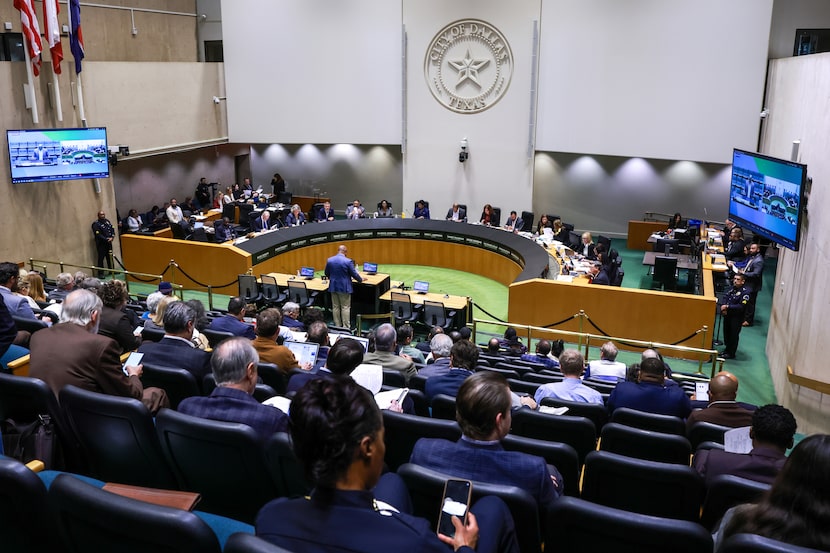
City Council members listen to speakers during a Dallas City Council meeting on Wednesday, Nov. 12, 2025, at Dallas City Hall. A resolution approved directs the City Manager to evaluate the future of Dallas City Hall and surrounding properties.
Christine Vo / Staff Photographer
City officials attribute City Hall’s decline to years of underfunding. In 2012, staff identified $397 million in facility needs across Dallas, but City Hall received no funding as the council prioritized flood control, economic development, and street improvements. In 2017, only $7 million of the requested $9.1 million was approved for basic repairs, such as roofing and electrical work.
By 2024, a $61 million request for City Hall repairs was slashed to $28 million by a bond task force, only to be completely cut by a last-minute council amendment.
“We’re the ones to blame for letting City Hall get to this state,” Blackmon said.
A Nov. 7 memo from Assistant City Manager Donzell Gipson revealed that since 2019, the city had not dedicated major funding for City Hall until 2023, when $3.3 million in federal coronavirus relief funds went toward boiler upgrades. The next year, $7.6 million was earmarked for generator and electrical upgrades, but the project stalled due to insufficient funding.
Jack Ireland, the city’s chief financial officer, told council members Wednesday that Dallas has about $10 million to $11 million in reserves that could be redirected for City Hall repairs, including $6.6 million from the stalled generator project and $2.8 million in leftover bond funds.
Ridley criticized the lack of public involvement, noting that residents at Wednesday’s meeting demanded a voice in the decision. He suggested a public vote on City Hall’s fate, arguing that the debate isn’t just about costs but about the building’s symbolic importance to Dallas.
“So much of what is being discussed isn’t about dollars and cents,” Ridley said. “It’s about the people’s relationship to this building and the relationship of the building to Dallas as its international symbol.”
There are also technical complications.
City Attorney Tammy Palomino noted Wednesday that City Hall Plaza, the land in front of the building, is designated parkland, meaning state law requires a citywide vote to sell it.
Earlier this year, the Landmark Commission began the process of designating City Hall as a historic landmark, which would temporarily block demolition for two years without commission approval. Final designation, however, rests with the City Council.
Reagan Rothenberger, the Landmark Commission member who requested the designation, cited downtown redevelopment plans, including the expansion of the Kay Bailey Hutchison Convention Center, as a key reason to preserve the building.
“It is unclear at this time how City Hall aligns with the vision of this monumental project and potential other projects to come,” Rothenberger wrote in a February letter. “It is now time to consider the historic value of Dallas City Hall in preparation for the area’s redevelopment over the next decade.”
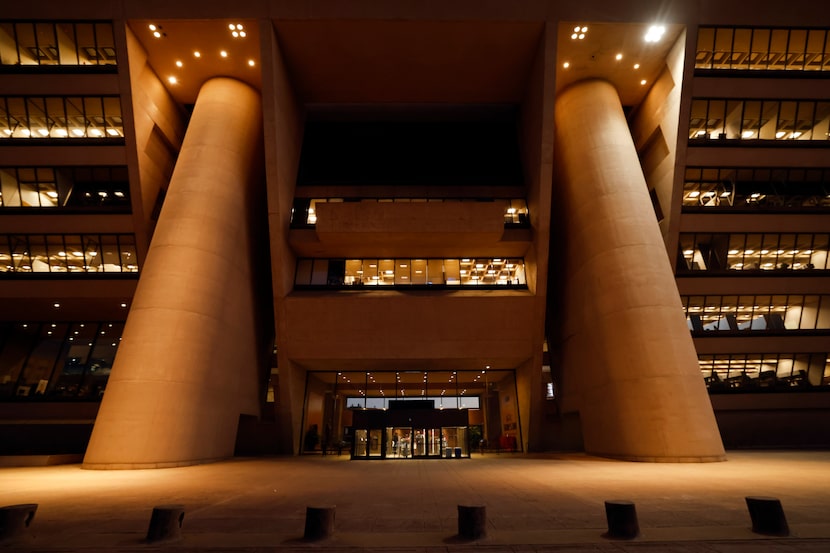
An exterior view of Dallas City Hall lobby entrance in downtown Dallas, November 4, 2025.
Tom Fox / Staff Photographer
Blackmon said she isn’t ready to commit to supporting landmark status but would consider it if the city decides to stay.
“I’m not going to vote for something just because I feel it’s going to tie it up,” she said.
Ridley, however, doubted the council would approve the designation if demolition is the goal.
“If there is this rush to demolish the building, which there appears to be, then I suspect that the council members would not vote to designate it because that would frustrate the effort to demolish the building,” he said.
Ridley also expressed doubt that, if the City Hall property were to become available, it would be redeveloped. He pointed to other projects in the area that have been in the works for years that still haven’t started. One example is One Newpark, a $380 million, 38-floor, 1.3 million-square-foot mixed-use tower planned for construction on land currently used as surface parking lots just south of Dallas City Hall. The City Council approved a $96 million tax incentive package for the project in June 2022.
“Why would a developer encumber themselves to buy a property with this huge building they’d have to tear down when they could have their choice of vacant land?” Ridley asked. “I don’t think it has much value right now because of that impediment, and because a large portion of the tract, the City Hall Plaza, is designated city parkland, which would require a vote of the residents of Dallas to sell.”
